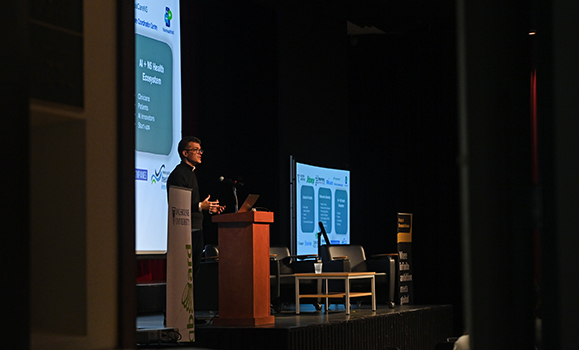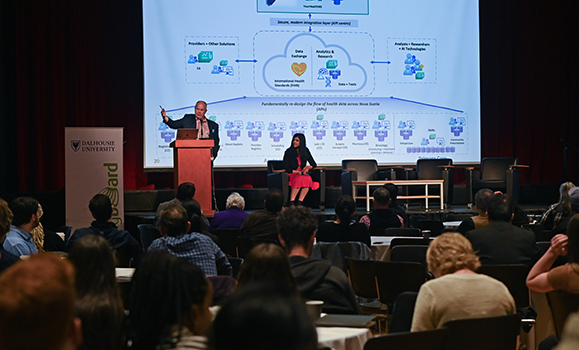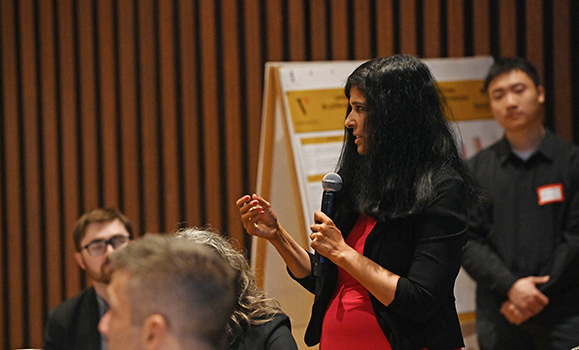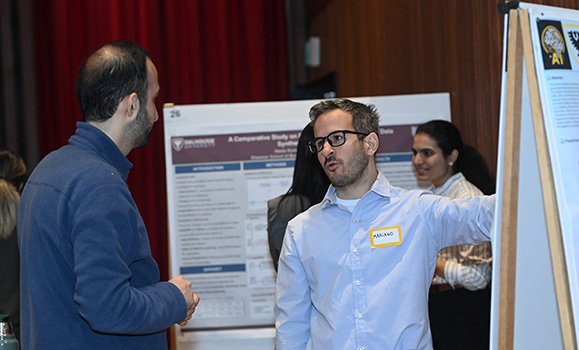As Andrew Cochran opened the final panel discussion at the first AV¾ãÀÖ²¿ AI Symposium, he summarized much of what was discussed throughout the day: we are living in AI times. Â
âSixteen months ago, I sat at my computer and asked a question to this new thing called ChatGPT,â explained Cochran, an instructor in the Faculty of Computer Science. âMy biggest surprise was not how quickly it showed me an answer, but how spontaneously I typed back, âThank you.â Not long after, author Walter Isaacson summed it up when he said ChatGPT was the moment AI became personal for all of us.â
The impacts of AI on our daily lives were a recurring theme at the day-long event on May 9. The sell-out event saw over 300 attendees from across education, research, industry, and government come together to explore the big opportunities and potential risks of AI adoption across domains.
Connecting community
Arguably one of todayâs most discussed topics, AI is transforming how industries, sectors, and organizations operate, opening the door to increased economic productivity and breakthrough innovations.
From improved skin cancer diagnosis and more sustainable oceans to confronting bias and bridging the digital divide, attendees engaged in talks, workshops, and panel discussions led by speakers and facilitators from industry, government, and academia. Keynotes were delivered by Dr. Doina Precup, a Canada CIFAR AI Chair from McGill University, Mila, and Google DeepMind; and Dr. Rada Mihalcea, from the University of Michigan. Students had the opportunity to showcase their AI research through a poster competition and were also invited to participate in a Generative AI and Oceans Hackathon, prior to the day, with student groups invited to present their ideas during an AI and Sustainability for Oceans workshop at the Symposium.
 Frank Rudzicz, committee chair, opens up the AI Symposium.
Frank Rudzicz, committee chair, opens up the AI Symposium.
Collaboration was a key theme across the day and much of the motivation behind launching the event. The organizing committee chair, Dr. Frank Rudzicz, intended the event to act as a platform for the Nova Scotian AI community to engage in meaningful dialogue.
âAI is one of our most impactful and complex technologies and there are huge opportunities if we take advantage of this moment as a community across the province,â says Dr. Rudzicz, who is the Canada CIFAR AI Chair, as well as an associate professor in the Faculty of Computer Science and research faculty member at the Vector Institute.
âThe AI Symposium is the first of its kind in Atlantic Canada and is intended to be the start of many initiatives aimed at connecting the AI community in Nova Scotia. It was fantastic to see folks from across disciplines engage in meaningful dialogue around how we can use AI to make a real difference and weâre now exploring how we can keep this momentum going.â
AI + Health
One domain that is becoming increasingly digital is health care. Nova Scotia Healthâs Dr. Tara Sampalli, senior director, implementation science, evaluation and global health systems planning, and Scott McKenna, chief information officer with both Nova Scotia Health and IWK Health, took to the stage for the symposiumâs invited talk to share how Nova Scotia's health-care system is adopting AI and testing new innovations to enhance patient care and increase productivity.

Scott McKenna and Dr. Tara Sampalli from NS Health during their invited talk
True to their ethos that technology adoption is always about people first, they also joined Dr. Rudzicz for an AI in Health workshop where they sought answers and feedback to some of their biggest questions around AI adoption and its impacts in health-care settings.
âNova Scotia has been leading the way globally in bringing best practice innovations and partnerships to the province through the Health Innovation Hub,â said Dr. Sampalli. âThese partnerships with academic and private industry partners are helping us address unique health-care needs of our communities across the province through virtual and digital solutions.â

Dr. Tara Sampalli interacts with the audience during an AI in Healthcare workshop
Some examples include Virtual Primary and Urgent care, Care Coordination Centre (Command Centre), Oncology Transformation Project, Robotics Centre of Excellence, and YourHealthNS. âThese large-scale data and digital transformations and partnerships with regional and global experts show that we are well underway to leverage the potential of AI in health,â she added.
McKenna echoed this, saying, âThe importance of digital health solutions has been embraced around the world in the past several years and the broader impact to our patients and systems shows even greater promise as AI adoption accelerates. The real power comes as we amass more data, it is higher quality, and we can unlock it through interoperability.
âWe are already leading the country and the region in many ways and pushing innovation. The results are speaking for themselves - shorter wait times, more time for our clinicians with patients, better use of resources, streamlined services, and better health for all."
Leading the way
AV¾ãÀÖ²¿ has become an emerging leader in AI research and talent development in recent years. The Faculty of Computer Scienceâs AI, Machine Learning, and Big Data research cluster has grown significantly in terms of the number of faculty, students, and research output; âAI and Digital Innovationâ has been prioritized as one of AV¾ãÀÖ²¿âs Strategic Research Clusters; and the institution is the first in the U15 group of research-intensive universities to appoint an institutional lead dedicated to AI strategy within education.
Student research poster session
Dr. Christian Blouin is that institutional lead as well as acting dean of the Faculty of Computer Science. He wrapped up the AI Symposium sitting on a panel discussing the question on the minds of everyone in attendance: should we speed up or slow down AI adoption?
âAV¾ãÀÖ²¿ is prioritizing [its] AI strategy and for good reason. Whether we speed up or slow down, the reality is [that] AI is here to stay and we need to take advantage of it,â said Dr. Blouin. âI hope that, coming out of today, we can start to envision a strong, unified foundation for AI in this province, along with local industry and governments, and I hope that we continue to put our efforts together to make that vision a reality.â


